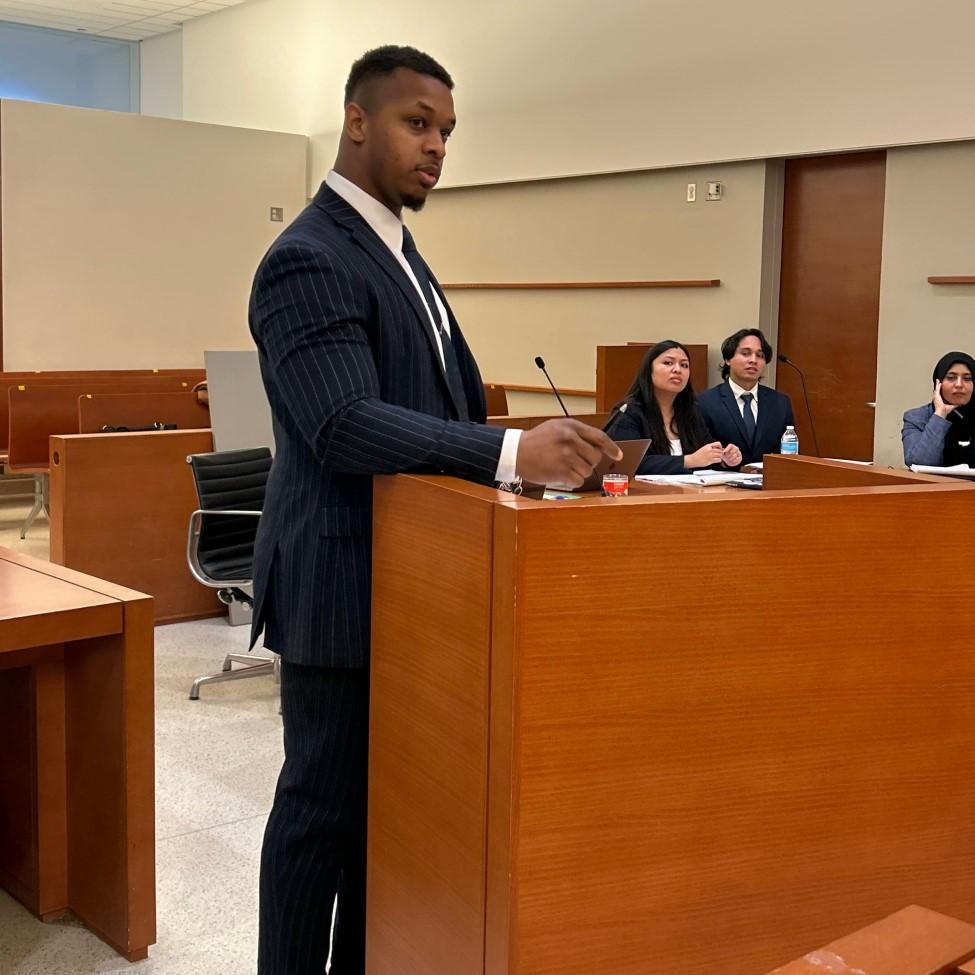
Kyle Davis-Edwards '25: Humble Beginnings to Milestone Moments
The youngest of seven, Kyle Davis-Edwards ’25 grew up in a loving, humble household where his parents held him to high expectations. “My parents enrolled me in a private high school with the expectation that I excel in the school’s top tier sports and academic programs,” shared Kyle. “While my parents were strict, it was their guidance that cultivated me into the disciplined and driven person I am today.”


The youngest of seven, Kyle Davis-Edwards ’25 grew up in a loving, humble household where his parents held him to high expectations. “My parents enrolled me in a private high school with the expectation that I excel in the school’s top tier sports and academic programs,” shared Kyle. “While my parents were strict, it was their guidance that cultivated me into the disciplined and driven person I am today.”
A first-generation law student, Kyle describes himself as someone who always wanted to be a catalyst for change – a fixer. “Growing up, I saw many problems within my community. I wanted to right all the wrongs that I saw in the world. I learned quickly that one way to do that was to study law and become a lawyer. I didn’t know any lawyers in my community, so I decided to be the first.”
For Kyle, pursuing his legal studies at the Elisabeth Haub School of Law at Pace University was a natural fit. “I loved my law school experience. There are so many people from so many places, and we acknowledge that we are all collectively in the same “fight.” The Law School campus community has always been a safe space where people and their views feel safe, respected, and heard. Pace Haub Law has what every student should want in their academic experience.”
The Law School campus community has always been a safe space where people and their views feel safe, respected, and heard. Pace Haub Law has what every student should want in their academic experience.
The classroom experience for Kyle is one that stood out to him, in particular his classes with Professor Smita Narula. “From day one, Professor Narula made sure that all students felt safe in her classroom. She fostered a classroom that empowered us to open our minds and explore more. She also always made herself available to students for any academic help in understanding complex legal issues.”

During his time in law school, Kyle pursued a variety of hands-on legal experiences as well. He interned with Roc Nation, with the Brooklyn County District Attorney’s Office, as a Criminal Justice Clinic Student Attorney, and at a private firm. “I gained so much from each of my internship experiences,” said Kyle. “I would like to pursue a career in entertainment law and intellectual property law and these experiences have helped to solidify that for me.”
While balancing his studies, Kyle was also an active member of several student organizations and also participated in the Black Entertainment Sports Lawyers Association (BESLA). “I had the opportunity through BESLA to participate in their 44th Annual Conference held in Mexico. It was a very humbling and inspiring experience.” Throughout the conference, Kyle spoke on several topics, including how to leverage internships experiences for in-house roles, the modernization of streaming royalties and artist advances, as well as how to prioritize health and wellness, specifically while in law school. At the conference, Kyle was awarded the BMW Ultimate Achiever Award, for his scholastic and extracurricular achievements. “I made so many connections at the BESLA Conference and spoke at length about my positive experiences at Pace Haub Law.”
His advice for future and current law students is to network, get involved early, and don’t give up. “From humble beginnings to the milestone moments I’ve achieved, my story is a testament to resilience, determination, and the power of a strong support system.” Kyle also stressed the importance of finding time to unwind. “If I wasn’t studying in the library, you could undoubtedly find me at the gym or a restaurant in Manhattan eating with friends and family. I like concerts and sports games. Law school is tough, but a Knicks game was certainly the inspiring reset needed to push through.”
Kyle is excited to begin his legal career with the Suffolk County District Attorney’s Office. “I look forward to sharpening my litigation skills and becoming the advocate that people need. I want to contribute to the legal field in a meaningful and purposeful way, using my voice where it matters most and in pursuit of true, fair, and equitable justice.”
Professor Rachel Rothschild Selected to Receive 2025–2026 Pace Haub Environmental Law Distinguished Junior Scholar Award
The Elisabeth Haub School of Law at Pace University is excited to announce that Professor Rachel Rothschild has been selected to receive the 2025–2026 Pace Haub Environmental Law Distinguished Junior Scholar Award. The Haub Environmental Law Distinguished Junior Scholar Award is presented annually to an emerging junior environmental law professor who exhibits scholarly excellence and promise at an early stage in their career. The Haub Environmental Law Faculty solicits nominations from law professors throughout the country and selects a recipient from that pool of nominations. The award recipient is invited to present his/her recent scholarship to the Haub Law community.
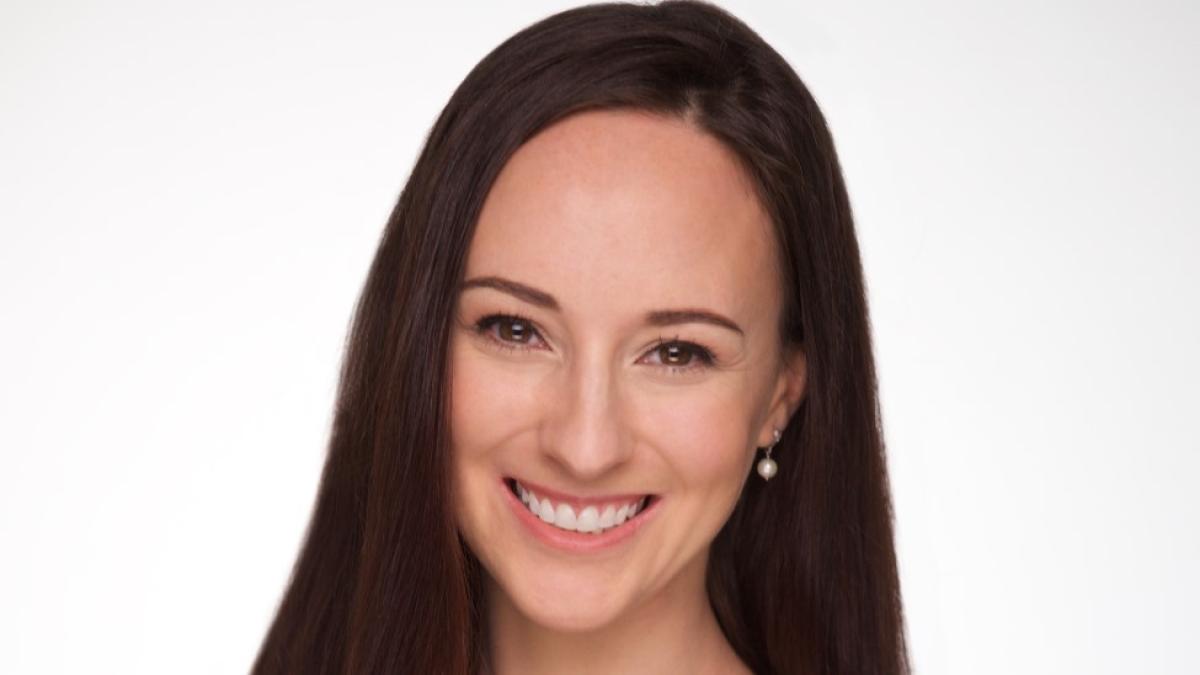

The Elisabeth Haub School of Law at Pace University is excited to announce that Professor Rachel Rothschild has been selected to receive the 2025–2026 Pace Haub Environmental Law Distinguished Junior Scholar Award. The Haub Environmental Law Distinguished Junior Scholar Award is presented annually to an emerging junior environmental law professor who exhibits scholarly excellence and promise at an early stage in their career. The Haub Environmental Law Faculty solicits nominations from law professors throughout the country and selects a recipient from that pool of nominations. The award recipient is invited to present his/her recent scholarship to the Pace Haub Law community.
Professor Rachel Rothschild is an assistant professor of law at the University of Michigan Law School. Before joining the Michigan Law faculty, she was a legal fellow at the Institute for Policy Integrity. From 2015 to 2017, she was an assistant professor and faculty fellow at New York University’s Gallatin School of Individualized Study. Professor Rothschild’s scholarship sits at the intersection of environmental law, history, and policy. Her recent research examines climate change law and policy as well as the past and present regulation of toxic substances.
“Professor Rothschild’s interdisciplinary scholarship allows for a unique perspective and approach to environmental law, climate change, and regulatory law and has already influenced the adoption and design of environmental statutes,” said Katrina Fischer Kuh, Faculty Director of the Environmental Law Program and Haub Distinguished Professor of Environmental Law at the Elisabeth Haub School of Law at Pace University. “Our Pace Haub Law community looks forward to welcoming and engaging with Professor Rothschild and learning from her in these subject areas.”
Professor Rothschild is the author of Poisonous Skies: Acid Rain and the Globalization of Pollution (University of Chicago Press, 2019) and has written numerous articles and essays on pollution problems for academic journals and media outlets. Her recent publications include The Origins of the Major Questions Doctrine, which examines how a legal challenge against a toxic chemical regulation became foundational precedent for the newly named major questions doctrine. She has also co-authored a paper, Development of the Navigation Guide Evidence-to-Decision Framework for Environmental Health, that aims to improve the use of science when regulating toxic chemicals, and has explored how physicists shaped judicial understandings of environmental expertise in the article Physicists as Environmental Experts. She is currently working on her second book project, tentatively titled Environmental Science and the Administrative State, which will examine the history of environmental science, regulation, and the courts from roughly the 1970s to the present.
“I am so thrilled to receive the 2025–2026 Pace Haub Environmental Law Distinguished Junior Scholar Award,” said Professor Rothschild. “It is an enormous honor to follow in the footsteps of previous award winners, who are a formidable group of scholars. I am also extremely grateful to the faculty at Pace Haub, many of whom provided incredible mentorship to me as I was preparing to transition to legal academia. It will be wonderful to share my recent scholarship with such an outstanding group of environmental law professors and receive their feedback on my work.”
Professor Rothschild holds a JD, cum laude, from NYU School of Law, where she was a Furman Academic Scholar, and a PhD in history of science from Yale University, where she was a National Science Foundation Graduate Research Fellow. She earned her BA, magna cum laude, from Princeton University.
Professor Rothschild will deliver the lunch keynote presentation on State Climate Superfunds at the 12th annual Future Environmental Law Professors Workshop organized and hosted by the Elisabeth Haub School of Law at Pace University.
Immersive Learning for a Sustainable Future: Pace Haub Law Hosts Innovative Summer Exchange Program with Jindal Global University
In July 2025, the Elisabeth Haub School of Law at Pace University welcomed students and faculty from O.P. Jindal Global University for an immersive academic experience focused on the intersection of corporate law and environmental sustainability.
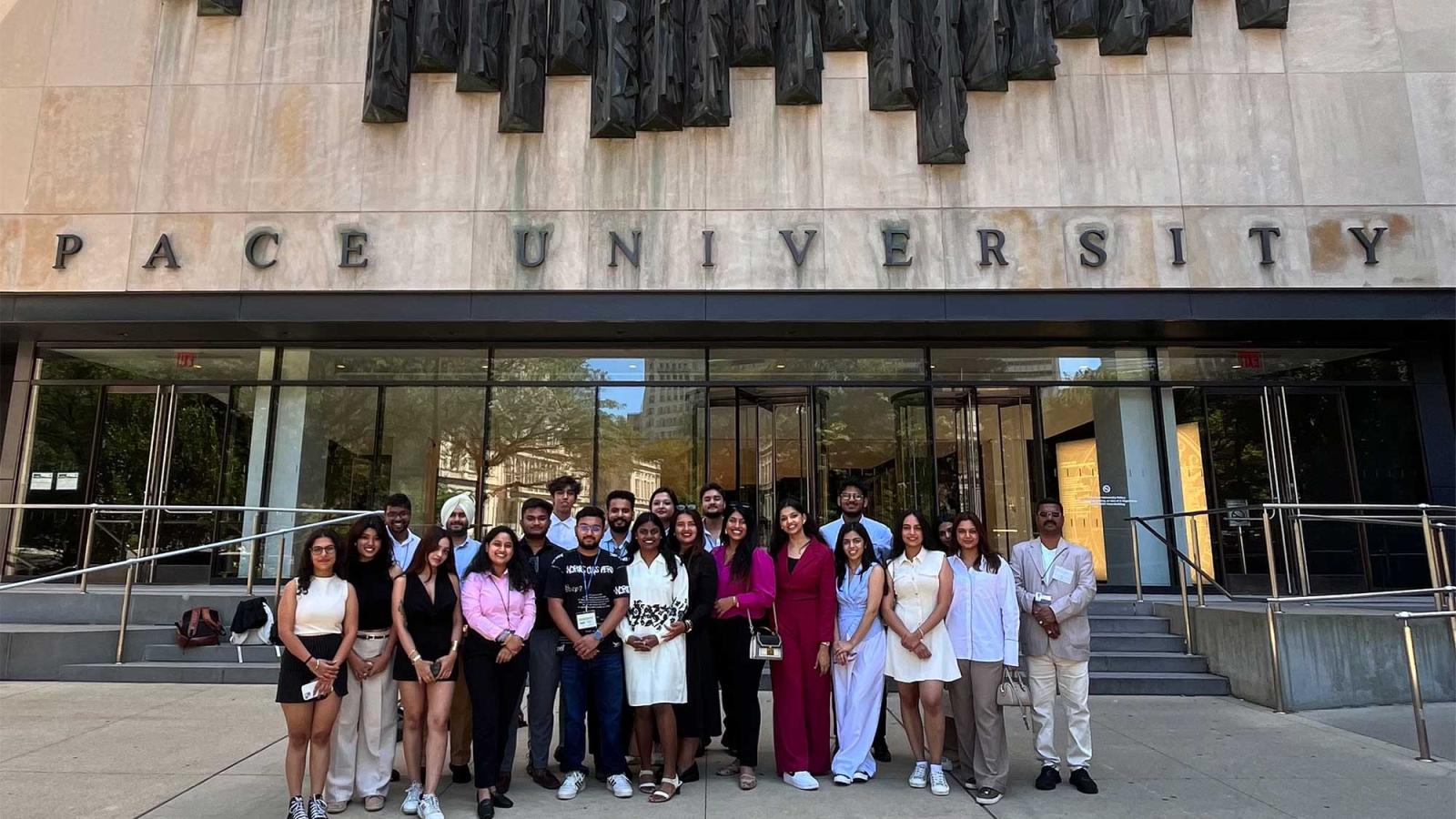
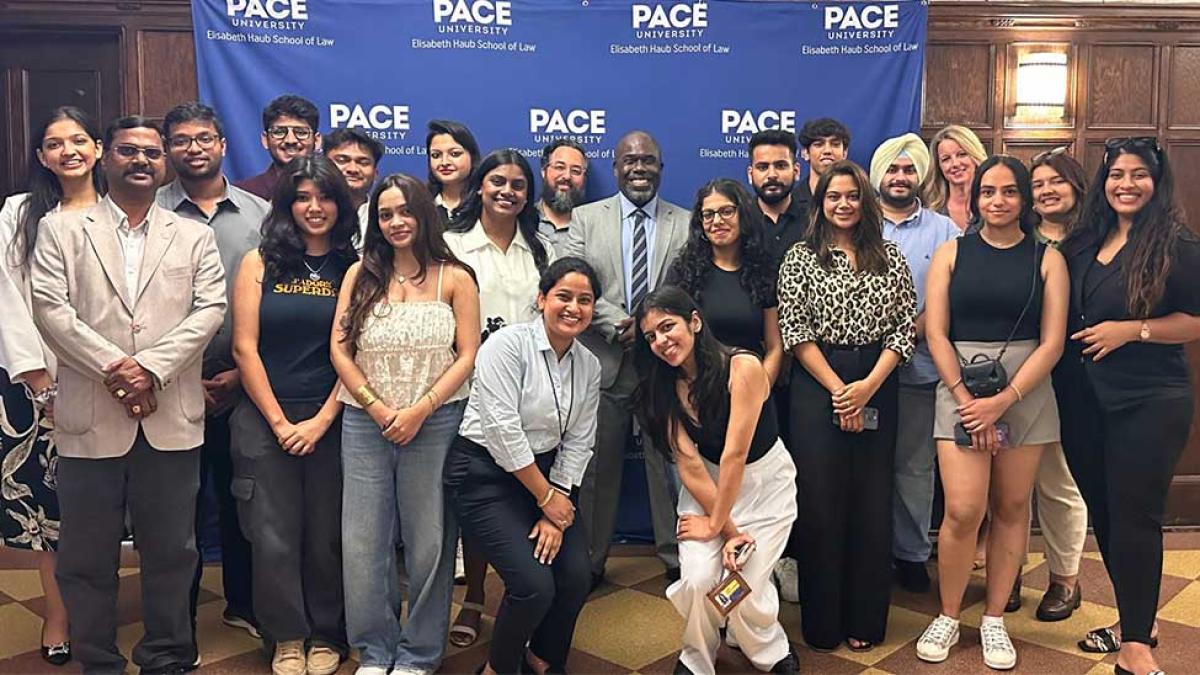
In July 2025, the Elisabeth Haub School of Law at Pace University welcomed students and faculty from O.P. Jindal Global University for an immersive academic experience focused on the intersection of corporate law and environmental sustainability.
The Elisabeth Haub School of Law at Pace University hosted an immersive three-week academic summer program for students from Jindal Global Law School, O.P. Jindal Global University. The one-of-a-kind program, titled Corporate Law & Sustainability: Reimagining Corporate Regulations in the Age of ESG, provided a rare opportunity to study at the intersection of law, business, and sustainability. The classes were held in July on the University’s New York City and Westchester campuses.
As part of this summer program, Pace Haub Law hosted sixteen students and two faculty members, Professor Manya Pundhir and Professor Dhwani Mainkar, from O.P. Jindal Global University. Students participated in a dynamic curriculum and rigorous schedule of classes led by Pace Haub Law professors and adjunct faculty including Lauren Roth, Bridget Crawford, Smita Narula, Jon Brown, Maria Lambert, and Victor Tafur. Co-Founder of Center for Global Sustainability Law and incoming Pace Haub Law SJD candidate, Akinola Afolarin, also delivered two lectures. The three-week program also included experiential opportunities, field excursions, and networking opportunities. These included a guided visit to the United States District Court for the Southern District of New York, a United Nations HQ and UN Global Compact tour, lunch at the Consulate General of India, and networking events such as a legal mixer on Governors Island hosted by the New York Climate Exchange with Pace Haub Law students in attendance as well.
“Over the course of three-weeks, both students and faculty alike had the opportunity to participate in rigorous coursework, real-world exposure, and cultural exploration,” said Maria Jovita Lambert, Associate Director of Graduate Admissions and International Affairs & Adjunct Professor of Law.
The program empowered students to learn and engage in areas that are reflective of real-world complexities. This was a dynamic and well-rounded experience carefully curated by Pace Haub Law.
Jindal Law School student Jayanti Singh shared her excitement upon being accepted into the summer program. “This experience was my first solo international trip and a transformative chapter in every sense. From policy debates and courtroom visits to learning about climate injustice, Pace Haub Law showed us what human-centered legal education looks like.”
A key component of the summer program included an intensive project that culminated in a student presentation on the best strategy for businesses to achieve environmental sustainability while avoiding political risks. The students had the opportunity to present on a variety of topics which included case studies of companies and countries. A panel of judges comprised of faculty and LLM and SJD students, including Achinthi C. Vithanage, Executive Director of the Environmental Law Program and a Professor of Law for Designated Service in Environmental Law, Josh Galperin, Faculty Director of the Sustainable Business Law Hub and Associate Professor of Law, Kiran Chahal, Pace Haub Law LLM Environmental Fellow, and Pace Haub alum Akinola Afolarin, evaluated the presentations based on a comprehensive predetermined rubric. The winning team included Ms. Anshika Chaudhary and Ms. Jayanti Singh with Ms. Srinitya Joshi receiving the award for best speaker.
“Pace Haub Law and O.P. Jindal Global University share a strong partnership, and this immersive academic program is our latest collaboration,” said Horace E. Anderson, Jr. Dean of the Elisabeth Haub School of Law. “Our continued collaboration with international institutions, such as O.P. Jindal Global University, provides us all an opportunity to learn globally and share our diverse perspectives.” Pace Haub Law has a historic and deep-rooted commitment to fostering collaboration with other academic institutions and in recent years has expanded its international academic partnerships even further with leading universities from Australia, Spain, Brazil, Germany, India, Switzerland, Mexico, and more. “These international partnership agreements provide a cooperative framework that continues to benefit students and faculty at both institutions, providing opportunities for global research, education and cultural immersion,” said Dean Anderson. Dean Horace Anderson and Pace University President Marvin Krislov each delivered remarks for the opening ceremony.
“I came to New York for the first time not only with an academic goal of completing this amazing program, but experiencing the cultural aspects of it as well,” said Jindal Law school student Aaryan Jha. “I won’t soon forget it all – from the lively classroom lectures to the late-night memories with new friends in the Law School’s dormitory, Dannat Hall. It was a transformative experience where I grew academically, emotionally, and culturally.”
A well-attended closing reception and dinner took place on Pace Haub Law’s campus where a keynote address was delivered by Professor Dan Esty, the Hillhouse Professor of Environmental Law and Policy at Yale University and a leading thinker on sustainable business law. The summer program’s success was the result of a coordinated effort by dedicated faculty, students, and administrators from both institutions. The innovative program would not have been possible without the dedicated efforts and organization by Adjunct Professor Maria Lambert, Professor Josh Galperin, Professor Smita Narula, and Assistant Dean for Admissions Cathy Alexander. In addition to the program hosted by the Law School, Pace University also hosted an academic exchange program for O.P. Jindal Global University students focused on Marketing, Entrepreneurship, and Finance, through the Center for Global Business Programs at the Lubin School of Business.
2025 O.P. Jindal Global Program
Brenda Dvoskin and Thomas E. Kadri Receive 2025–2026 Haub Law Emerging Scholar Award in Women, Gender & Law
Professors Brenda Dvoskin of Washington University School of Law and Thomas E. Kadri of the University of Georgia School of Law have been selected as the recipients of the 2025–2026 Haub Law Emerging Scholar Award in Women, Gender & Law for their article Safe Sex in the Age of Big Tech Feminism, forthcoming in the Harvard Journal of Law & Technology.
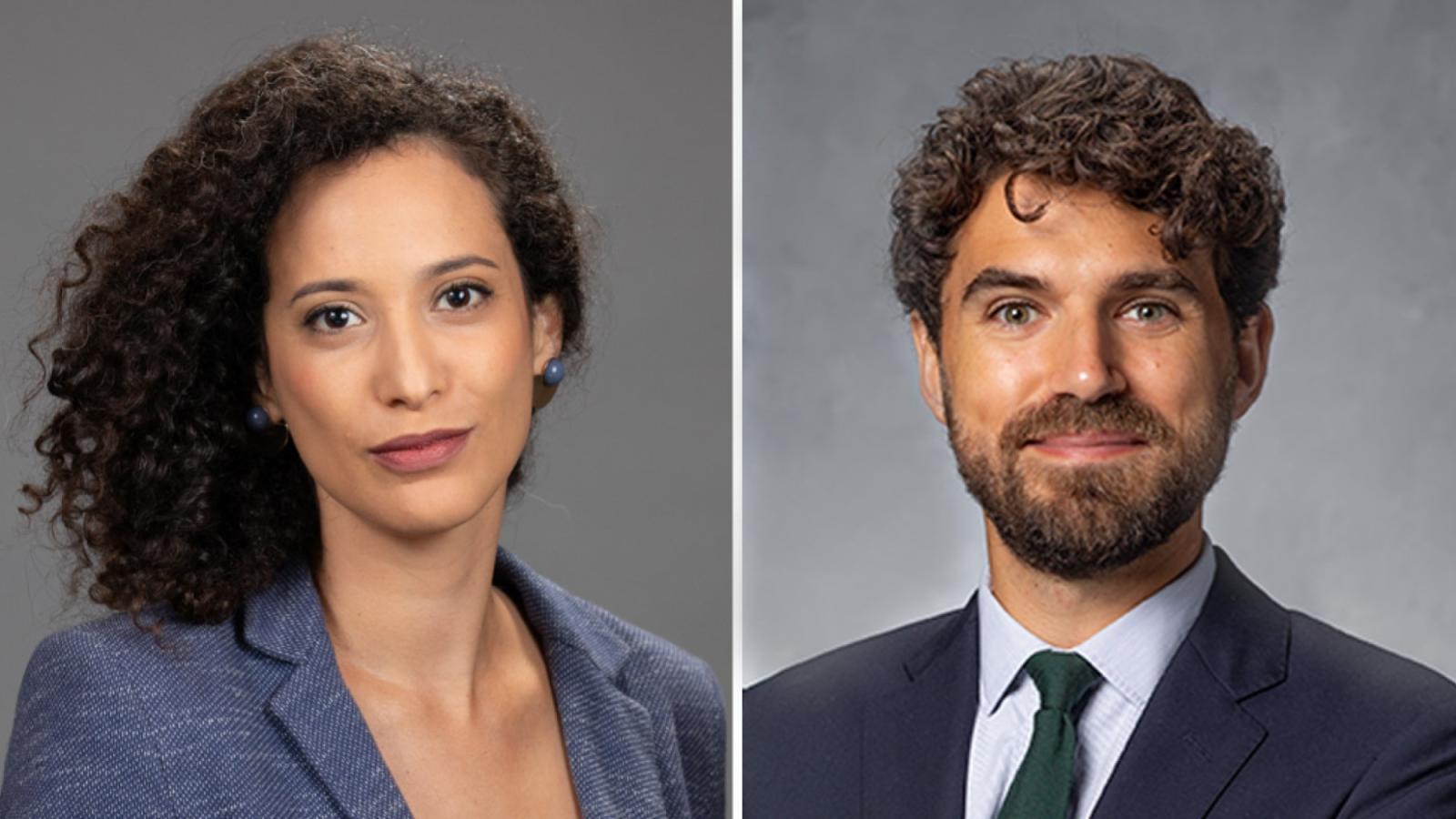
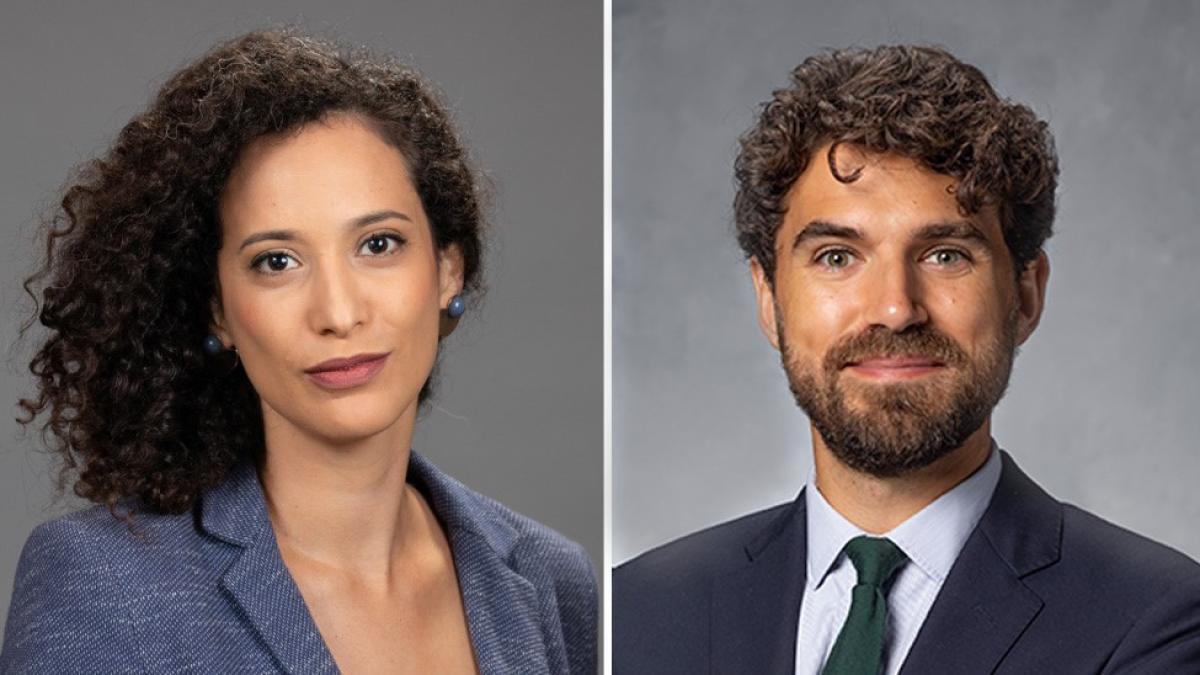
Professors Brenda Dvoskin of Washington University School of Law and Thomas E. Kadri of the University of Georgia School of Law have been selected as the recipients of the 2025–2026 Haub Law Emerging Scholar Award in Women, Gender & Law for their article Safe Sex in the Age of Big Tech Feminism, forthcoming in the Harvard Journal of Law & Technology.
Dvoskin and Kadri’s article offers a powerful critique of what they call “Big Tech feminism,” the regulatory and ideological movement through which lawmakers, technology companies, and some feminist advocates invoke women’s safety to justify prudish, punitive, and profit-driven restrictions on online sexual expression. Drawing on queer and critical feminist theory, the authors argue for a reimagined regulatory framework—one that shifts away from censorship and criminalization and toward empowering individuals to shape the norms and structures of digital sexual life.
Professor Dvoskin’s scholarship spans law, technology, and gender, with recent work on online safety, sexual privacy, and content moderation. She is an active contributor to global academic forums on law and technology and her work has been published in Fordham Law Review, Harvard Journal of International Law, Washington Law Review, and others. Professor Kadri writes at the intersection of law and digital abuse, with articles published or forthcoming in California Law Review, Texas Law Review, UCLA Law Review, and others. He is also the Legislative & Policy Director at Cornell’s Clinic to End Tech Abuse and principal investigator on a major NSF-funded project exploring AI, privacy, and law enforcement.
Professor Emily Gold Waldman, a member of the award committee, commented: “Safe Sex in the Age of Big Tech Feminism is a pathbreaking piece that challenges the conventional wisdom about online safety and feminist regulatory aims. Dvoskin and Kadri force us to grapple with how well-intentioned interventions can undermine sexual autonomy and reproduce carceral logics.”
About the Award
The Haub Law Emerging Scholar Award in Women, Gender & Law is presented annually in recognition of outstanding legal scholarship related to gender and the law by a full-time law professor with five or fewer years of teaching experience. Papers are selected through a blind review process conducted by a committee of Haub Law faculty with expertise in gender and law. This year’s judges were Professors Jessica Miles, Emily Gold Waldman, and Bridget Crawford. The award recipients will be invited to present their work to the Haub Law community during the 2025–2026 academic year.
Nominations for the 2026–2027 award are due by July 1, 2026, and should be directed to Professor Bridget Crawford.
A Family Legacy: Raquel Sammartano's Journey to Becoming a Physician Assistant
Meet Raquel Sammartano! In May she represented the College of Health Professions (CHP) at the national 2025 American Academy of Physician Associates (AAPA) Conference and Expo in Denver, Colorado with her father, Robert Sammartano, PA-C, also in attendance!
We connected with Raquel to learn more about her academic and professional journey, inspired by her father to follow in his footsteps as a PA.
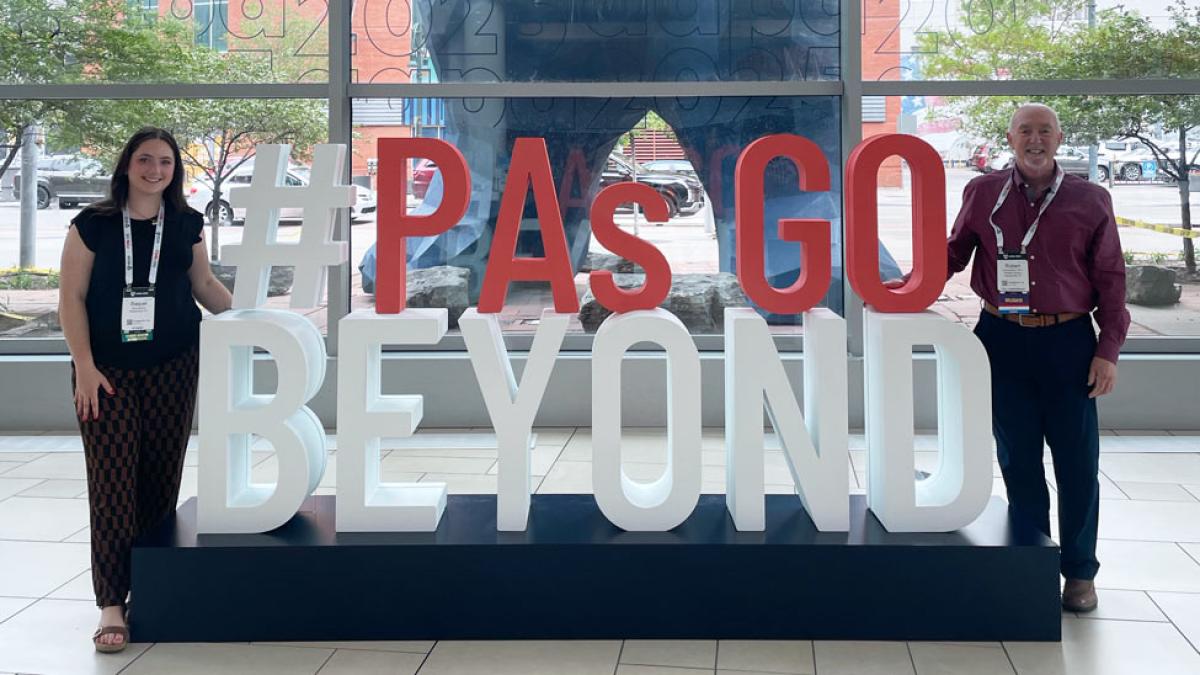
Meet Raquel Sammartano! After receiving her Bachelor of Arts degrees in Biology, Psychology, and Italian from Binghamton University, Raquel enrolled in the Physician Assistant (PA) Program-Pleasantville. In May she represented the College of Health Professions (CHP) at the national 2025 American Academy of Physician Associates (AAPA) Conference and Expo in Denver, Colorado. But what made this experience extra special was her father also being in attendance.
Robert Sammartano, PA-C, is currently a faculty member at the University of Mount Saint Vincent PA Program and has been an instrumental part of Raquel’s personal and professional journey – motivating her to follow in his footsteps as a PA.
What inspired you to become a PA?
Growing up, I had the unique opportunity to watch a PA make a real impact every day—my dad, a PA in pediatric surgery. I saw how he balanced medical knowledge with meaningful patient relationships, and how his role allowed him to diagnose, treat, educate, and advocate for his patients when I was on rounds with him. Over time, my own experiences in healthcare settings only solidified what I already knew: becoming a PA was the path that felt right for me.
How has your father (a PA-C) impacted your own journey to become a PA?
My father didn’t just introduce me to the PA profession, he embodies the kind of provider I hope to be. His work ethic and compassion are inspiring, never sugarcoating the challenges, and always speaks about the privilege of helping patients in vulnerable moments. He has encouraged me to find my own path but has also provided mentorship at each stage of the journey, from answering questions about clinical scenarios to helping me reflect on the responsibility that comes with the role.
What insights into the life of a PA did you get growing up?
From a young age, I observed the demands of the role—long hours, complex cases, difficult conversations—but also the rewards: the gratitude of patients, the trust of the care team, and the fulfillment that comes from making a difference. I learned that being a PA isn’t just about medicine, it’s about adaptability, communication, and trust. Those insights helped me approach this path with realistic expectations and respect for the profession.
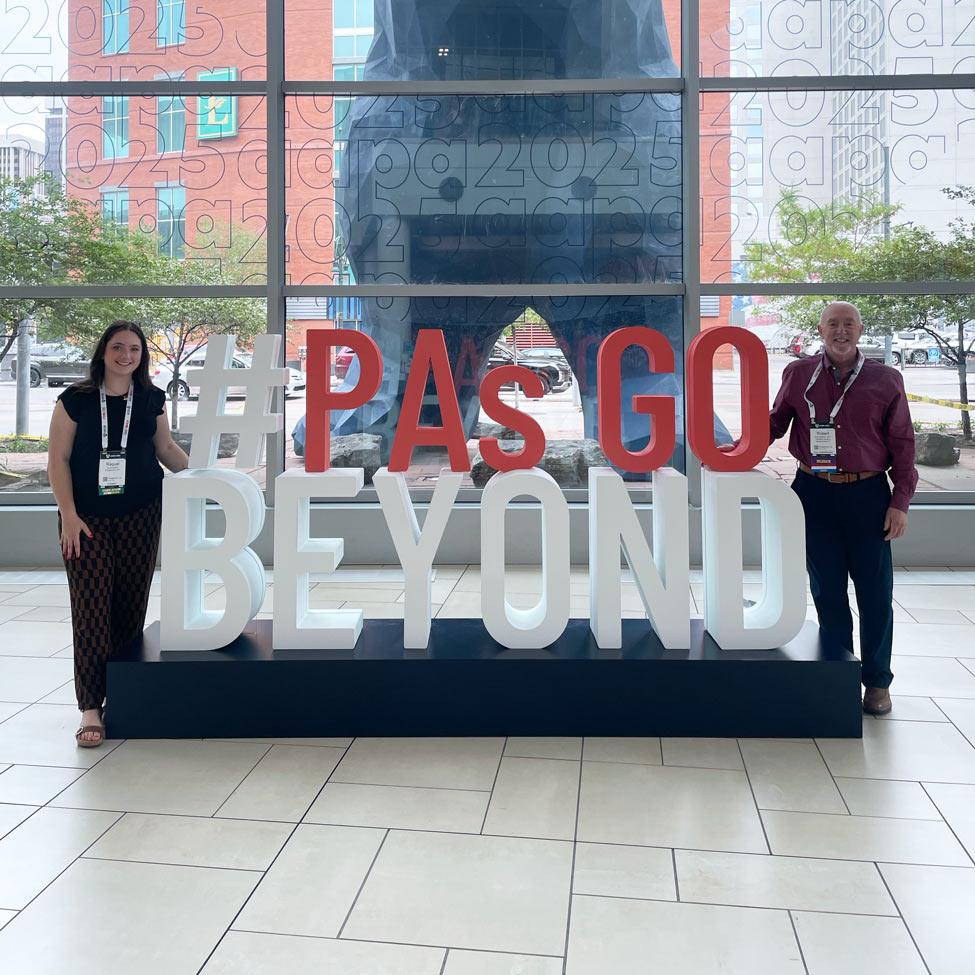
What was it like attending the national AAPA conference in a professional capacity alongside your father?
Attending AAPA was truly an amazing experience for me. I was honored to represent Pace as the AAPA Student Academy Representative (SAR), which gave me the opportunity to attend the conference and take part in discussions about the future of our profession. I’m incredibly grateful to my professors and program leadership who supported and encouraged me to pursue this opportunity because they were instrumental in making it happen.
What was it like representing the Physician Assistant Program - -Pleasantville at the conference?
Walking into a space filled with PA leaders, educators, and students from across the country, I felt a strong sense of pride in where I come from and the education I’m receiving.
Being there as a SAR gave me a new perspective on the broader impact we can have outside the classroom and clinic. I had the chance to meet and connect with student representatives from programs across the country, including other SARs who I quickly formed friendships with. We’re already planning to attend next year’s conference together, and those connections have become a meaningful part of my professional and personal network.
Why did you pick Pace (College of Health Professions) to continue your education?
I chose CHP because I was looking for a PA program that combined rigorous academic training with a supportive, close-knit learning environment. I knew I wanted to build strong connections with both my peers and professors while being a part of a community where everyone was truly invested in each other’s success.
What really confirmed my decision though was the interview process. Those can be intimidating by nature, but my experience at Pace was completely different. The faculty created an environment where I didn’t feel pressured or judged—instead, I felt like they genuinely wanted to get to know me beyond what was on my application. I walked away from the interview feeling seen, supported, and excited at the thought of joining a program that values who you are just as much as what you’ve achieved.
How has the Pleasantville PA program supported your professional development?
The program has played a huge role in shaping not just my clinical knowledge, but the kind of provider I will become. The faculty push us to meet a high standard of excellence, but they never let us go it alone. Their support is constant and intentional, always available, encouraging, and truly invested in our growth. From clinical reasoning and technical proficiency to communication and patient-centered care, they ensure we’re equipped to be well-rounded, thoughtful, and highly capable providers.
There’s also a strong emphasis on empathy and professionalism, which reminds us that medicine is about people, not just diagnoses. That balance of high expectations and unwavering support has been incredibly motivating.
If you could give any advice to someone interested in pursuing the PA profession, what would it be?
Stay curious! Never be afraid to ask questions, whether you’re shadowing, in class, or in clinicals. Some of the best learning happens when you lean into what you don’t know and even by making mistakes. This profession is built on lifelong learning, and curiosity is what keeps you growing.
I’d also say: know in your heart why you want to become a PA and hold onto that. This path can be intense and challenging but staying true to your values and knowing your “why” will carry you through.
And finally, what does it feel like to be following in your father's footsteps as a PA?
It’s incredibly meaningful. There’s a sense of pride in knowing I’m carrying forward a legacy of care and service. While our journeys are our own, I often think of how my dad has impacted so many lives, —and that motivates me to work hard, stay grounded, and always remember why I chose this path.
It was especially meaningful to see my father in his role as the surgical representative in the House of Delegates (HOD). Watching him bring his surgical perspective into important policy discussions—raising concerns, offering insight, and contributing to thoughtful debate—was a full-circle moment for me, as I step into my own leadership role while witnessing him continue to lead in his. Sharing that space with him was both humbling and motivating, and it solidified my commitment to being an active voice in the PA community.
Raquel is expected to graduate from Pace University in 2026.
“Blue Sky Thinking in a Red Sky World”: Environmental Law Scholars Chart a Path Forward
Over the course of three days, the Environmental Law Collaborative (ELC) convened in Briarcliff Manor, New York to discuss “Blue Sky Thinking in a Red Sky World.” The ELC comprises a rotating group of law professors who assemble every other year to think, discuss, and write on an important and intriguing theme in environmental law. This year, the group focused on how to think optimistically and proactively about environmental protection when so much is going so quickly in the opposite direction.
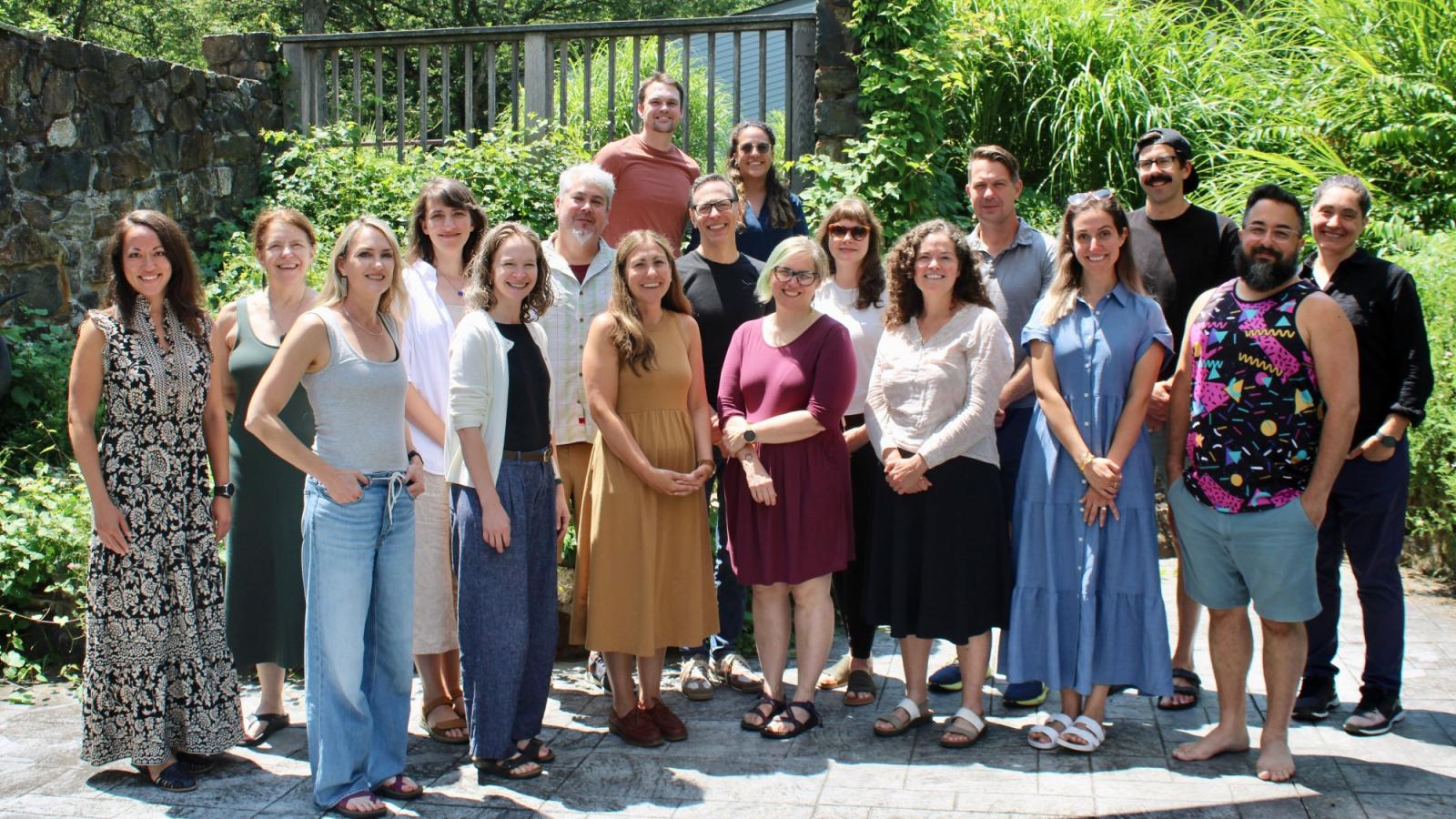
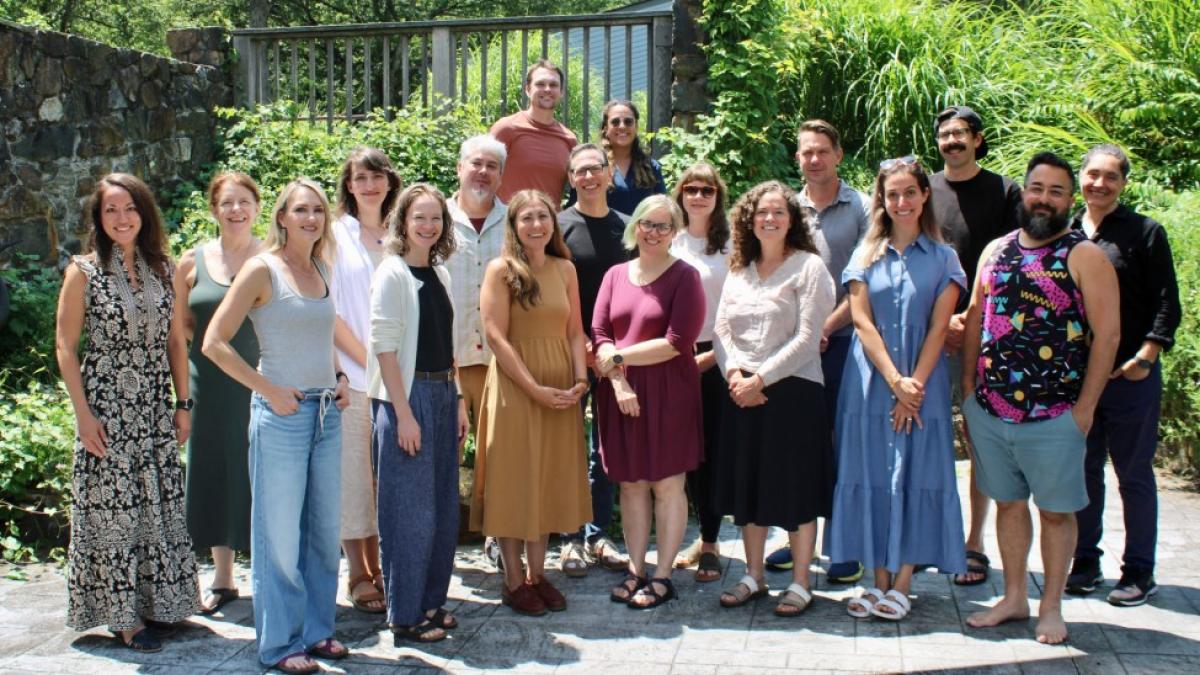
Over the course of three days, the Environmental Law Collaborative (ELC) convened in Briarcliff Manor, New York to discuss “Blue Sky Thinking in a Red Sky World.” The ELC comprises a rotating group of law professors who assemble every other year to think, discuss, and write on an important and intriguing theme in environmental law. This year, the group focused on how to think optimistically and proactively about environmental protection when so much is going so quickly in the opposite direction.
The ELC facilitates dialogue among thought leaders and the goals of the bi-annual ELC meeting are both scholarly and practical with participants seeking to use their areas of scholarly expertise to study trends and significant events, ultimately hoping to improve the environmental conditions of today’s world and for the future. As part of the 2025 meeting, 18 scholars met to share ideas and collaborate for a forthcoming article and book. Participants included Elisabeth Haub School of Law at Pace University Professors Josh Galperin, Margot Pollans, and Camila Bustos, as well as recent Pace Haub Law Visiting Assistant Professor Paul Rink. Professor Galperin was on the planning team for this year’s conference and will co-edit the forthcoming book.
This year’s meeting was made possible in part through support from The Haub Innovation Fund, which is part of the generous naming gift to the Elisabeth Haub School of Law at Pace University, made by the Haub Family, tireless environmental advocates and philanthropists.
Pace Women’s Justice Center Announces 2025 “Raising the Bar” Benefit Concert Featuring GRAMMY Winners Colbie Caillat and Shawn Colvin
Voted Westchester’s Best Nonprofit Event 2024, Raising the Bar returns Friday, October 24, 2025 to the Capitol Theatre featuring TWO GRAMMY-winning performers for the first time ever: Colbie Caillat and Shawn Colvin. Hosted by the Pace Women’s Justice Center, this trailblazing Westchester benefit concert continues to raises the bar as October’s must-attend event—uniting music, community, and purpose for Domestic Violence Awareness Month


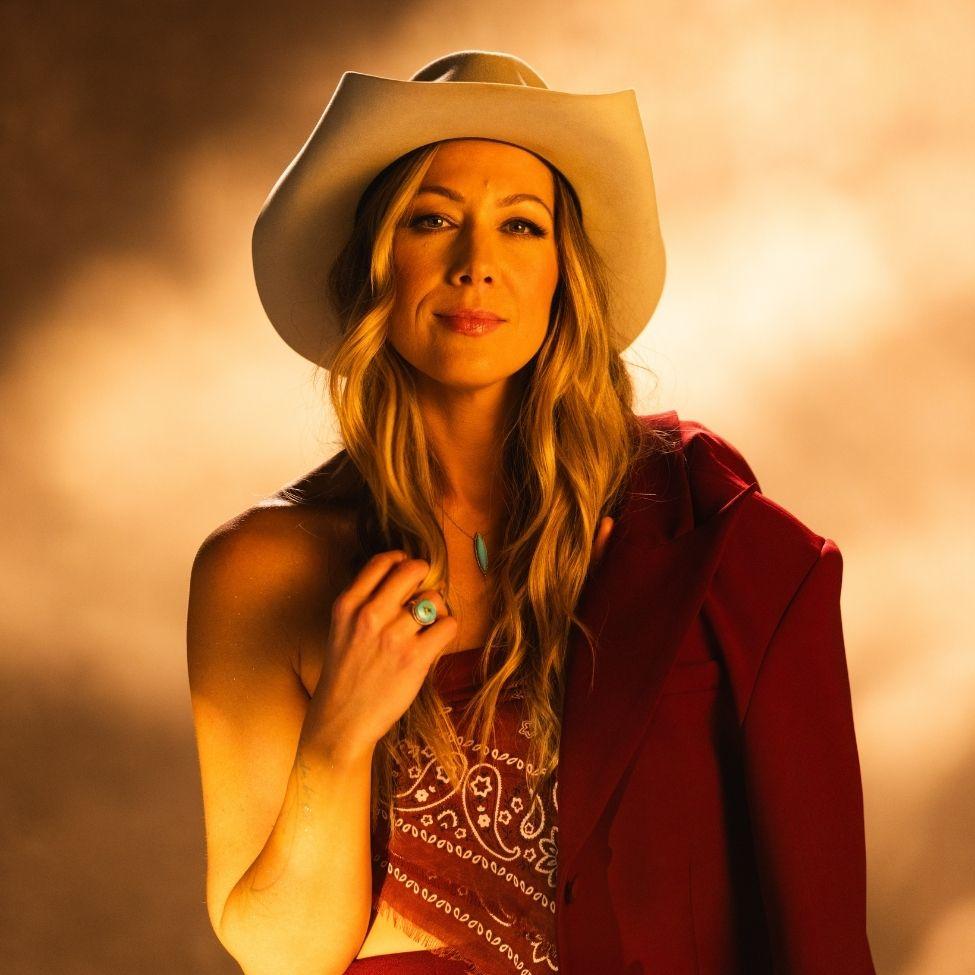
The Pace Women’s Justice Center (PWJC) is thrilled to announce its 2025 "Raising the Bar" Benefit Concert, headlined by not one, but two powerhouse GRAMMY Award-winning artists: Colbie Caillat and Shawn Colvin. Set for Friday, October 24, 2025, at the legendary Capitol Theatre in Port Chester, NY, this highly anticipated event will combine incredible music, community energy, and the fight for justice as part of Domestic Violence Awareness Month.
Recently named Westchester Magazine’s 2024 Best Nonprofit Event, Raising the Bar has long set the standard for benefit concerts in the region. Named in honor of PWJC’s mission to expand access to justice, the event raises critical funds that directly support it's FREE critical legal services for victims of domestic violence, sexual assault, and elder abuse, helping clients move forward on their paths to safety, empowerment, and healing. With two GRAMMY-winning artists headlining for the first time in its history, this year’s concert raises the bar like never before—galvanizing the community in a powerful stand for justice and support for survivors.
Cindy Kanusher, Esq., Executive Director of PWJC, shares, "We are beyond excited to welcome Colbie Caillat and Shawn Colvin to our Raising the Bar Concert. Their music has inspired millions, and their commitment to purpose-driven artistry mirrors our mission to serve and empower survivors. This event is more than a concert—it's a gathering for justice, healing, and the power of community support."
Tickets for the 2025 “Raising the Bar” Benefit Concert go on sale to the public starting to the public starting Friday, August 1 at 10:00 a.m.
Sponsorships are available and include exclusive VIP experiences, premium concert seating, access to a private artist reception, and your brand showcased on Capitol Theatre’s iconic digital screens. Information on sponsorship opportunities for this event can be found on the Raising The Bar website.
Purchase Tickets Become a Sponsor
Pace Women’s Justice Center thanks Raising the Bar 2025 Sponsors:
Legendary Sponsors: Robert Gib Nathan & Jane Aoyama
The Hot 100 Sponsors: Carol & Ian Feldman; Jacqueline Hattar, Esq.
About the Artists
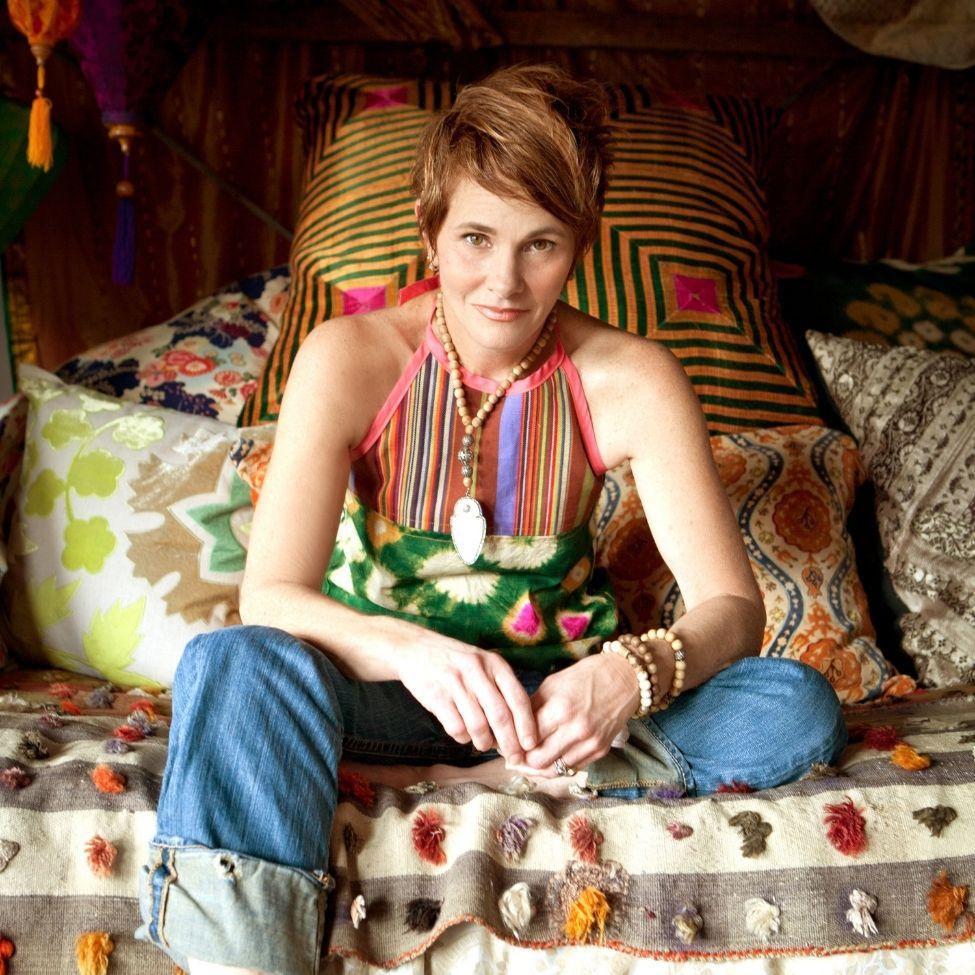
Colbie Caillat is a 2X GRAMMY Award-winning, 5X GRAMMY-nominated singer-songwriter whose music has garnered over 15 billion global streams. She has received numerous accolades, including nominations from the Billboard Music Awards, American Music Awards, MTV Video Music Awards, and BMI Pop Awards. Her debut album, COCO, reached #5 on the Billboard Top 200 Albums chart and is certified 3X Platinum, while her Platinum-selling follow-up, Breakthrough, debuted at #1 on the Billboard 200.
Shawn Colvin stopped the industry in its tracks with her arresting 1989 debut, Steady On. The following spring, Colvin took home the GRAMMY Award for Best Contemporary Folk Album, establishing herself as a mainstay in the singer-songwriter genre. In the ensuing 30 years, Colvin has won three GRAMMY Awards, released thirteen superlative albums, written a critically acclaimed memoir, maintained a non-stop national and international touring schedule, appeared on countless television and radio programs, had her songs featured in major motion pictures and created a remarkable canon of work.
Interview Availability: Colbie Caillat, Shawn Colvin, and Cindy Kanusher, Esq., Executive Director of PWJC, are available for interviews upon request. Please email Melissa McMonagle at mmcmonagle@law.pace.edu or call (914) 422-4396.
Honoring: Dr. Nadine Macaluso

Raising the Bar also shines a spotlight on changemakers through the Making a Difference Award. This year, PWJC proudly honors Dr. Nadine Macaluso, a psychotherapist and author whose personal and professional life is a beacon of hope for survivors. After enduring marriage to the infamous “Wolf of Wall Street,” Nadine Macaluso, PhD, has made it her life’s work to help other women understand, escape, and heal from their trauma bonds with pathological partners. Her own toxic relationship inspired her to become a psychotherapist, specializing in narcissistic abuse, trauma bond relationships, and complex PTSD. Her book, Run Like Hell, offers the reader both her personal experience and professional expertise to explain the behaviors of pathological lovers (PL), reveal the traits of women who become the “victims” of PLs, how women can leave safely, and most importantly, heal. Nadine shows how women can be "surthrivers" of these trauma bonds and go on to have healthy, positive relationships and lives armed with knowledge and awareness. Her work exemplifies PWJC’s mission of transforming pain into power.
About Pace Women’s Justice Center
The Pace Women’s Justice Center (PWJC) provides free civil legal services to over 3,500 survivors of domestic violence, sexual assault, and elder abuse each year. Our multilingual legal support helps clients understand their rights, navigate the legal system, and break the cycle of abuse—especially those from low-income and marginalized communities.
We offer direct representation in cases involving orders of protection, divorce, spousal support, child custody, visitation, and support. We also work closely with community partners to connect clients to additional resources such as shelter, housing, counseling, and more. Beyond legal services, PWJC leads and participates in more than 140 training and outreach programs annually to raise awareness and engage professionals and the public in the fight to end interpersonal violence.
Located in Westchester County and serving clients throughout New York, PWJC is a self-funded nonprofit legal center under the 501(c)(3) status of Pace University. With more than 33 years of experience, and a dedicated team of attorneys, professional staff, volunteers, and law students, PWJC has built an effective, coordinated community response to interpersonal violence.
Musical Theater Meets Social Justice: Q+A with Jesse Ciron '26
Jesse Ciron ’26, Writing for Diversity and Equity in Theater and Media, is creating theater that reflects who we are and who we can become. Discover how this aspiring playwright is using storytelling to champion representation and social change.


Jesse Ciron
Class of 2026
BA in Writing for Diversity and Equity in Theater and Media
How did you become interested in pursuing a BA in Writing for Diversity and Equity in Theater and Media?
I was an undecided major my first year at Pace with an intention to pursue musical theater. In my UNV 101 class, however, I learned about the BA in Writing for Diversity and Equity in Theater and Media major, and, after meeting with Assistant Dean S. Brian Jones, MA, and talking about the program and its experiences, I knew that it was for me. It incorporates what I am passionate about: theater, identity, diversity, social justice, and representation.
Why did you choose to attend Pace?
I always knew that I wanted to go to college in New York City and was also familiar with Pace University far before the application process began, as I lived near the Pleasantville campus. The student body at Pace is extremely diverse and are pioneers of social change, and that is what drew me here.
What have your experiences been like in the program and the faculty that teach within it?
I have had nothing but wonderful and supportive experiences with the program. Assistant Dean Jones has always been an advocate for his students and their voices; he is the best teacher, mentor, and cheerleader. In addition, my advanced writing in playwriting professor, Joanie Drago, helped me experiment with all my creative ideas and is the main person I thank for helping me develop my writing style. Further, as a cohort, students love to utilize each other in our creative journeys and provide opportunities for one another in our own works.
The student body at Pace is extremely diverse and are pioneers of social change, and that is what drew me here.
What kind of activities have you been engaged in as part of this program and how have they been meaningful to you?
Due to my enrollment in this program, I was able to present my work at the Future of Humanities event at Pace, attend events at The Broadway League and within the Pace Career Pathway Program, tour the New York Theatre Workshop, and so much more. These activities have been meaningful by encouraging me to network and providing me with learning opportunities in the theater and performing arts industries.
What would you like to do upon graduation/what are your career goals?
My career goals are to work for a local theater company here in New York, produce my own musical, and continue acting. One day, I hope to teach and work with a children’s/youth theater and provide upcoming generations with an educational opportunity like mine.
Are there any challenges you have faced that you overcame and are proud of?
A lifelong challenge has been the journey of finding my voice and identity. Being a child of immigrants, the only one in my family pursuing anything within the arts, and many more aspects of who I am, have shaped and formed my understanding of myself and the world around me. While the journey is ongoing, my experience at Pace has helped me form myself as an individual and an artist as well.
What advice would you like to give to our current students?
To current and incoming students in my major, appreciate the journey and don’t forget to reach out to the people around you. Friends and family, whether biological or chosen, are always here to support you.
Scoring Big in Human Resources
From club leader to Human Resources intern, Maxelle Cohen ’26 brings passion and purpose to HR with the New York Islanders.

Maxelle Cohen
Class of 2026
Pronouns: she/her/hers
Currently Studying: BBA in Human Resource Management & Sports Marketing Minor
Member (Clubs): President & Co-Founder of the Undergraduate Human Resources Management Club & Member of American Marketing Association

Why did you choose Pace University and the Lubin School of Business?
When I first began applying to colleges, I wasn’t sure what direction I wanted to take.
After visiting several campuses in the tri-state, Pace University’s Lubin School of Business stood out to me. Its strong business program, prime city location, and overall environment felt like the perfect fit for my academic and professional growth. As an HR major, I was especially drawn to all the on-campus and off-campus opportunities, including internships, clubs, and hands-on experiences.
How have clubs on campus helped enrich your student experience?
Serving as the President and Co-Founder of the Undergraduate Human Resources Management Club has been one of the most meaningful parts of my college journey. I still remember writing in my Pace Path presentation during UNV 101 that one of my goals was to start my own club, and seeing that vision come to life alongside my peers has been incredibly rewarding. This experience has allowed me to connect with fellow students who share my passion for HR and to create valuable opportunities, such as hosting guest speakers like Mehnaz Ladha from NBCUniversal, to help us all grow our networks and gain real-world insights.
How has the Pforzheimer Honors College benefitted you?
The Pforzheimer Honors College has benefitted me in many ways, which challenged me to go beyond the standard coursework and think more critically and creatively. In addition, the opportunity to do research and special projects have allowed me to explore my interests on a deeper level, which I am excited to work on this year with my thesis advisor. The Honors College also gave me access to unique academic opportunities, like priority advising and professional development resources that allow me to tailor my education toward my career goals.
What has been your favorite opportunity at Pace?
There are so many ways I could answer this question. From what I’ve learned in class to the incredible events I’ve attended, but my favorite opportunity at Pace has been finding friends who are just as driven and passionate about their goals as I am. Being surrounded by people who are motivated, ambitious, and genuinely supportive has pushed me to grow both personally and professionally. For example, one of my friends is working at BBC Studios, and another is interning at Warner Bros. this summer. Seeing them achieve their goals inspires me every day. I truly don’t know where I’d be today without their constant encouragement and belief in me; they’ve helped me stay focused, take risks, and pursue every opportunity with confidence.
What has your experience been like interning with the New York Islanders' HR team?
Interning with the New York Islanders this past summer was truly an unforgettable experience. As the only HR intern in the department, I was lucky to receive one-on-one mentorship and hands-on opportunities every single day. From the moment I joined, the team made me feel welcomed and valued, encouraging me to take initiative and contribute in meaningful ways. During my time there, I assisted with the recruiting process, onboarding new employees, conducting compliance audits, and supporting employee engagement initiatives. Working so closely with experienced HR professionals gave me an inside look at how HR operates within a professional sports organization and solidified my passion for pursuing this career path. Overall, this internship allowed me to build practical skills, boost my confidence, and expand my network in the sports industry; it was an experience that truly shaped my goals for the future.
How did Lubin help prepare you for your internship in human resources?
Lubin prepared me well for my HR internship by providing a strong foundation in both the theory and practical aspects of HR Management. Through my HR class with Professor Coatman and other courses in my curriculum, I was able to learn essential topics that helped me understand the key functions of HR before starting my internship. Additionally, Lubin’s courses that are filled with case studies, group projects, and real-world applications taught me skills like communications and problem solving that were helpful with my team at the Islanders. The support from professors in both my human resources major and sports marketing minor gave me the confidence and preparation I needed to step into the professional world.
The support from professors in both my human resources major and sports marketing minor gave me the confidence and preparation I needed to step into the professional world.
What have you learned about the sports industry through your internship that surprised you?
As a Sports Marketing minor, I’ve taken classes like Sports Sponsorship and Special Events Marketing, which gave me a strong foundation in understanding what goes on behind the scenes in the sports world. But during my internship, I was surprised to see just how much work happens beyond the visible areas like marketing and game day operations. Departments that often stay behind the scenes, such as HR, strategy & analytics, and partnerships, play an equally, if not more, crucial role in building and maintaining a strong team culture. In an industry that’s always under public scrutiny, having a motivated and well-supported staff is essential for success, and the Islanders are an organization that truly invests in making this happen.
Do you have any advice for other Lubin students?
My biggest piece of advice for other Lubin students is to really focus on building and maintaining a strong professional network. I know the word “networking” probably gets thrown around a lot during your four years at Pace, but it truly is the key to success. This is especially true in the sports industry, which is extremely competitive and can be tough to break into. The connections you make can open doors to opportunities that aren’t even posted online. Attend events, join clubs, and don’t be afraid to reach out to professionals for informational interviews, even a simple LinkedIn message can go a long way. The relationships you build now can end up being the key to unlocking your future, whether it’s in sports or any other field you choose, so make sure you’re prioritizing that while exploring your career options at Pace.
What does #LubinLife mean to you?
To me, #LubinLife is more than just classes and assignments. It is a community that pushes you to be your best every day. It is about those moments when a professor goes beyond the textbook to share real industry insights, guest speakers who open doors, and clubs that turn ideas into action. When I think about what #LubinLife means, it is getting hands-on experience while building relationships that truly matter, all while discovering who you want to be in the business world.









